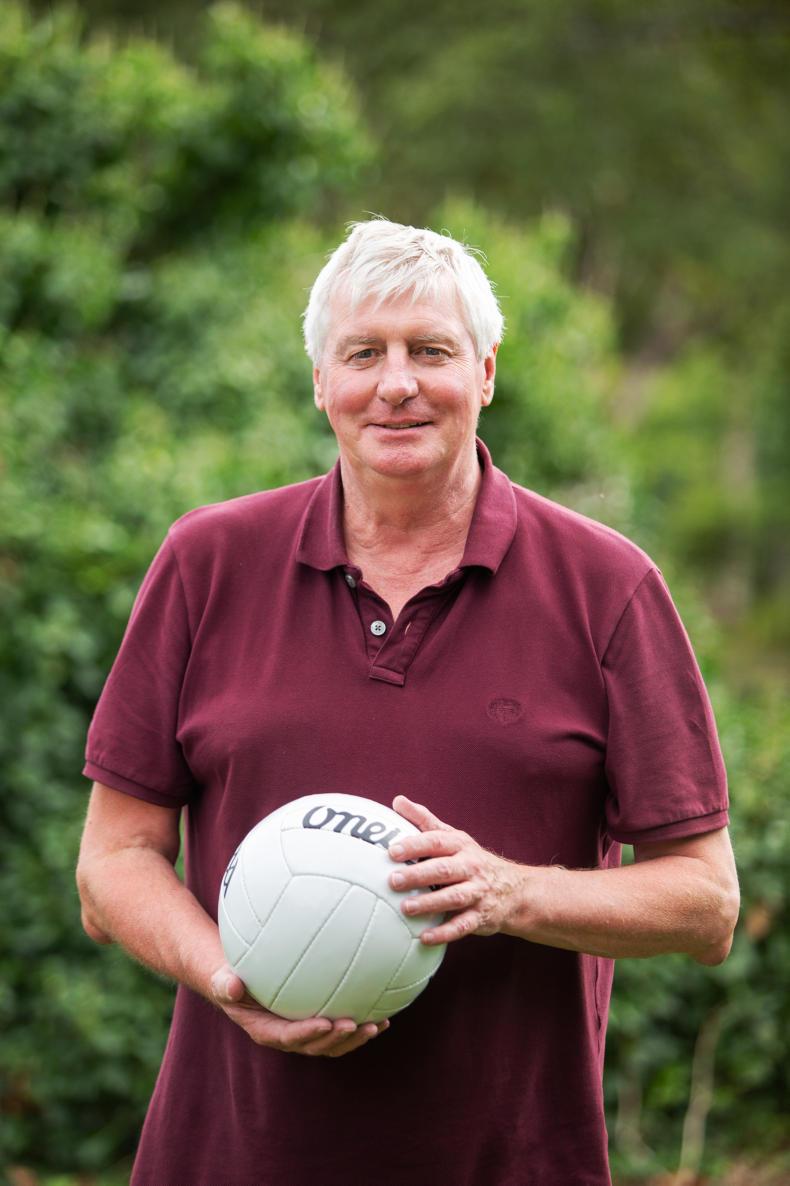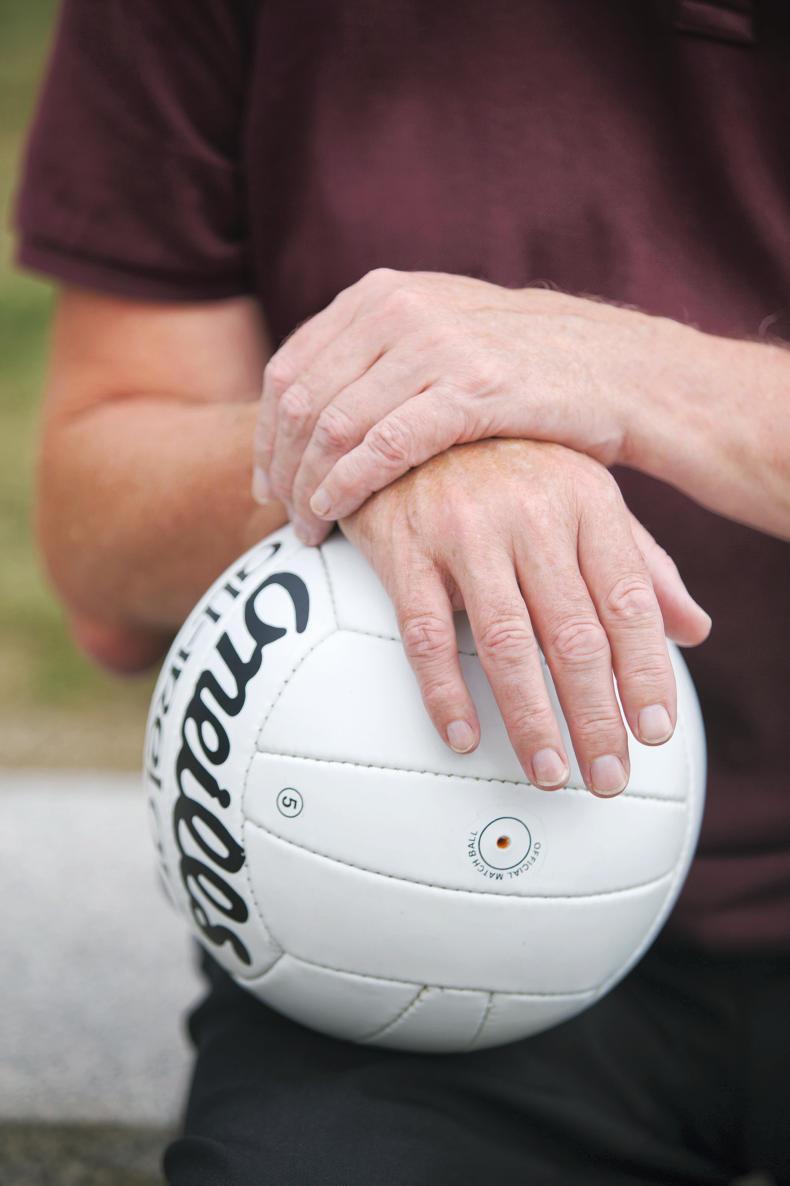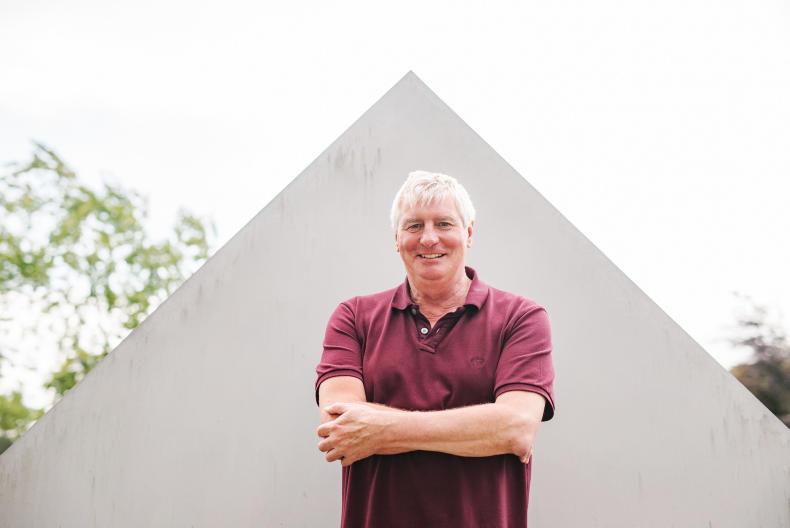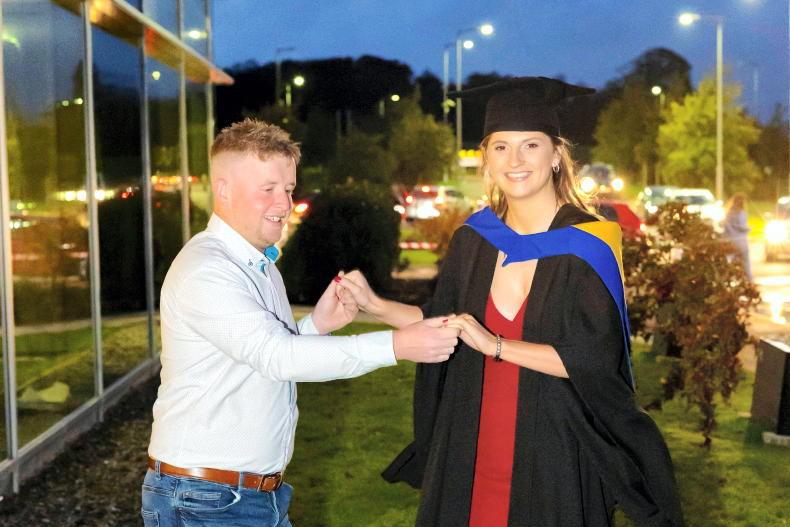Michael Lyster is pretty unflappable, but naturally that comes with the territory when it’s part and parcel of your job to marshal some of the most opinionated people in Gaelic games – the likes of Joe Brolly, Pat Spillane and Ger Loughnane.
For the last 35 years working on The Sunday Game, Michael has been the man who stimulated debate, reined in rants and ultimately became the face of the programme that brought the nation’s best-loved sports to the masses.
This Sunday will be his last time broadcasting an All-Ireland final on the programme he has fronted for so long, as he prepares to pass the torch on to Joanne Cantwell, an already established face on The Sunday Game.
When news of Michael’s retirement broke this summer – as an RTÉ staff member he has to retire when he turns 65 – there was something of a frenzy in the media. It’s to be expected I guess; after all, The Sunday Game is nothing short of a national institution and Michael will always be intrinsically linked with the show.
But, in his typical level-headed manner, Michael isn’t getting hot under the collar about the end of this particular era. “I’m retiring from RTÉ, but not from life. There will be something else,” he remarks lightly of the situation.
Because of my health issues, it’s appropriate to take a bit of time out. Then just see when I get bored – actually when my wife gets fed up of looking at me at home
And it’s important to note too that although this weekend’s Dublin v Tyrone clash will be the anchor’s last All-Ireland, he is actually not retiring until February 2019, with his last television broadcast being the All-Stars in November.
In his typical pragmatic manner, Michael says he does not want a big fuss, because it’s just not his style. Also, he is not ruling out any opportunities that might come his way in the future.
“I’m fortunate in the sense that because I’m full-time staff here at RTÉ, when I retire next year in February I have an RTÉ pension, so I’m not in a hurry to figure out how I’m going to earn a living next. I can think about it and just see. Also for me, because of my health issues, it’s appropriate to take a bit of time out. Then just see when I get bored – actually when my wife gets fed up of looking at me at home,” he laughs.
“Then I’ll see where we take it next, but I’m not frantically making plans, because I don’t have to. If something that I like comes, then yeah.”
Lucky escape
Michael is married to Anne and they have four children. I enquire if it’s two boys and two girls? “More like two men and two women,” is the quick reply.
In 2015, Michael suffered cardiac arrest at his home in Dublin and was kept alive by Anne, who performed CPR until an ambulance arrived. Previously, in 2012, the broadcaster discovered he had heart failure. He’s now a campaigner on heart heath and this experience too has influenced his perspective on his upcoming retirement. Michael says that there was a chance after the cardiac arrest that he may never do another broadcast again.
“When people ask me: ‘How do you feel about retiring?’ In June of 2015 I collapsed and essentially, as people would have done in the past, dropped dead. That’s actually what happened to me, but because of people knowing a bit more about CPR and intervention these days, I survived this event,” explains Michael.
“That night I collapsed, the chances of me ever doing another Sunday Game were nil. Even if I had survived it without CPR and they got my heart going, the next problem then is that I could have suffered brain damage, because lack of oxygen to the brain for more than about four minutes is deadly.
“I just managed to get out of jail here reasonably well intact. Because of that, it makes it easier for me to cope with retirement – because I’m actually getting a retirement.”
The beginning
From the village of Bearna Dearg outside Tuam, Michael’s journalism career started out in The Tuam Herald, where he covered news, sport and essentially anything else that was thrown at him. He made the move cross-country to RTÉ at the end of 1979, working in radio for four years initially.
He explains that 1984 proved to be a defining year for him, as it was then he first presented on television. Also that summer he worked on his first Olympic Games.
Along with Moya Doherty, he presented a programme called Daybreak LA, a breakfast show around the Los Angeles Olympics. Suddenly, Michael found himself to be very much in demand.
“Later in the year, again myself and Moya were asked to present the All-Ireland disco dancing championships in Cork on RTÉ. Really, I’m presenting this thing, I’m there in the middle of them and I’m thinking to myself: ‘What the hell am I doing here?’ This is what happens, you’re a new face on television, you become flavour of the month and then everybody wants to have you involved.
“I got asked shortly after that to do a young people’s science programme, which I turned down. I turned it down on the basis that I said to myself: ‘Where do I want to go here? Do I want to be running around like a blue-arse fly doing this, that and the other thing, or will I just concentrate on The Sunday Game?’, which at this stage had become part of my brief.

Michael Lyster pictured at RTÉ ahead of his retirement. \ Claire-Jeanne Nash

Michael Lyster pictured at RTÉ ahead of his retirement. \ Claire-Jeanne Nash
“So I made the decision to concentrate on sport and stick to that area, rather than be off doing other things. And for me that was a good decision to make, because after 35 years it worked out well in the end,” grins Michael.
“I’ll tell ya, I didn’t know an awful lot about disco dancing, I have to admit that.”
As the games of both hurling and football evolved throughout the latter part of the 20th century, the popularity of The Sunday Game grew and grew.
The advent of broadcasting matches live in the early 90s compounded the show’s iconic status. Last year’s All-Ireland football final was second only to The Late Late Toy Show in terms of viewing figures.
Analysis has become a fundamental element of The Sunday Game and with sometimes unyielding views given by analysts, Michael has refereed a fair few tussles over the years.
“If I ever figure out how to handle these guys I’ll let you know,” Michael smiles.
“Ah look, it’s years working with them: whether it’s Spillane and Brolly or Ger Loughnane, whatever the case may be, my job is to let them flow – but not to let them go too far.
“I don’t want to be in studio sitting on top of them: ‘Don’t go there and don’t say this,’ because that’s going to stint the whole thing. Not that you could stint them anyway. It’s a balancing act, it’s a case of letting it go and flow as much as you can, but then just trying to keep an eye on it, make sure it doesn’t get out of hand.”
Clearly, Micheal is both a dab and seasoned hand when it comes to what he does, but Irish Country Living wants to know very simply: does he enjoy it?
“It’s the best. You get paid for going to sports events and apart from The Sunday Game, which most people associate me with, I have covered soccer internationals, Champions League matches, Formula 1 Grands Prix, the World Rally Championships and hockey internationals. It’s been a whole gambit of various stuff.”
The camera is poised and ready for Michael’s All-Ireland broadcasting finale, but for the man himself it’s simply business as usual, and that’s why he’s so good at what he does.
“The last football team that were going in this direction were Kerry in 1982 – that was for the five-in-a-row, and of course an Offaly team upended that. The same thing actually happened to the Kilkenny hurlers a couple of years ago, the ‘drive for five’. You have to acknowledge that Dublin, by the looks of it, are ahead of Tyrone, but having said that, no match is a foregone conclusion, so we will have to just wait and see what happens. But if you said to me: ‘Here’s a €20 note, go down to the bookies’…”
Read more
The Marty magic
Pat Spillane: Today’s Dublin wouldn’t hold a candle to 80s Kerry
Michael Lyster is pretty unflappable, but naturally that comes with the territory when it’s part and parcel of your job to marshal some of the most opinionated people in Gaelic games – the likes of Joe Brolly, Pat Spillane and Ger Loughnane.
For the last 35 years working on The Sunday Game, Michael has been the man who stimulated debate, reined in rants and ultimately became the face of the programme that brought the nation’s best-loved sports to the masses.
This Sunday will be his last time broadcasting an All-Ireland final on the programme he has fronted for so long, as he prepares to pass the torch on to Joanne Cantwell, an already established face on The Sunday Game.
When news of Michael’s retirement broke this summer – as an RTÉ staff member he has to retire when he turns 65 – there was something of a frenzy in the media. It’s to be expected I guess; after all, The Sunday Game is nothing short of a national institution and Michael will always be intrinsically linked with the show.
But, in his typical level-headed manner, Michael isn’t getting hot under the collar about the end of this particular era. “I’m retiring from RTÉ, but not from life. There will be something else,” he remarks lightly of the situation.
Because of my health issues, it’s appropriate to take a bit of time out. Then just see when I get bored – actually when my wife gets fed up of looking at me at home
And it’s important to note too that although this weekend’s Dublin v Tyrone clash will be the anchor’s last All-Ireland, he is actually not retiring until February 2019, with his last television broadcast being the All-Stars in November.
In his typical pragmatic manner, Michael says he does not want a big fuss, because it’s just not his style. Also, he is not ruling out any opportunities that might come his way in the future.
“I’m fortunate in the sense that because I’m full-time staff here at RTÉ, when I retire next year in February I have an RTÉ pension, so I’m not in a hurry to figure out how I’m going to earn a living next. I can think about it and just see. Also for me, because of my health issues, it’s appropriate to take a bit of time out. Then just see when I get bored – actually when my wife gets fed up of looking at me at home,” he laughs.
“Then I’ll see where we take it next, but I’m not frantically making plans, because I don’t have to. If something that I like comes, then yeah.”
Lucky escape
Michael is married to Anne and they have four children. I enquire if it’s two boys and two girls? “More like two men and two women,” is the quick reply.
In 2015, Michael suffered cardiac arrest at his home in Dublin and was kept alive by Anne, who performed CPR until an ambulance arrived. Previously, in 2012, the broadcaster discovered he had heart failure. He’s now a campaigner on heart heath and this experience too has influenced his perspective on his upcoming retirement. Michael says that there was a chance after the cardiac arrest that he may never do another broadcast again.
“When people ask me: ‘How do you feel about retiring?’ In June of 2015 I collapsed and essentially, as people would have done in the past, dropped dead. That’s actually what happened to me, but because of people knowing a bit more about CPR and intervention these days, I survived this event,” explains Michael.
“That night I collapsed, the chances of me ever doing another Sunday Game were nil. Even if I had survived it without CPR and they got my heart going, the next problem then is that I could have suffered brain damage, because lack of oxygen to the brain for more than about four minutes is deadly.
“I just managed to get out of jail here reasonably well intact. Because of that, it makes it easier for me to cope with retirement – because I’m actually getting a retirement.”
The beginning
From the village of Bearna Dearg outside Tuam, Michael’s journalism career started out in The Tuam Herald, where he covered news, sport and essentially anything else that was thrown at him. He made the move cross-country to RTÉ at the end of 1979, working in radio for four years initially.
He explains that 1984 proved to be a defining year for him, as it was then he first presented on television. Also that summer he worked on his first Olympic Games.
Along with Moya Doherty, he presented a programme called Daybreak LA, a breakfast show around the Los Angeles Olympics. Suddenly, Michael found himself to be very much in demand.
“Later in the year, again myself and Moya were asked to present the All-Ireland disco dancing championships in Cork on RTÉ. Really, I’m presenting this thing, I’m there in the middle of them and I’m thinking to myself: ‘What the hell am I doing here?’ This is what happens, you’re a new face on television, you become flavour of the month and then everybody wants to have you involved.
“I got asked shortly after that to do a young people’s science programme, which I turned down. I turned it down on the basis that I said to myself: ‘Where do I want to go here? Do I want to be running around like a blue-arse fly doing this, that and the other thing, or will I just concentrate on The Sunday Game?’, which at this stage had become part of my brief.

Michael Lyster pictured at RTÉ ahead of his retirement. \ Claire-Jeanne Nash

Michael Lyster pictured at RTÉ ahead of his retirement. \ Claire-Jeanne Nash
“So I made the decision to concentrate on sport and stick to that area, rather than be off doing other things. And for me that was a good decision to make, because after 35 years it worked out well in the end,” grins Michael.
“I’ll tell ya, I didn’t know an awful lot about disco dancing, I have to admit that.”
As the games of both hurling and football evolved throughout the latter part of the 20th century, the popularity of The Sunday Game grew and grew.
The advent of broadcasting matches live in the early 90s compounded the show’s iconic status. Last year’s All-Ireland football final was second only to The Late Late Toy Show in terms of viewing figures.
Analysis has become a fundamental element of The Sunday Game and with sometimes unyielding views given by analysts, Michael has refereed a fair few tussles over the years.
“If I ever figure out how to handle these guys I’ll let you know,” Michael smiles.
“Ah look, it’s years working with them: whether it’s Spillane and Brolly or Ger Loughnane, whatever the case may be, my job is to let them flow – but not to let them go too far.
“I don’t want to be in studio sitting on top of them: ‘Don’t go there and don’t say this,’ because that’s going to stint the whole thing. Not that you could stint them anyway. It’s a balancing act, it’s a case of letting it go and flow as much as you can, but then just trying to keep an eye on it, make sure it doesn’t get out of hand.”
Clearly, Micheal is both a dab and seasoned hand when it comes to what he does, but Irish Country Living wants to know very simply: does he enjoy it?
“It’s the best. You get paid for going to sports events and apart from The Sunday Game, which most people associate me with, I have covered soccer internationals, Champions League matches, Formula 1 Grands Prix, the World Rally Championships and hockey internationals. It’s been a whole gambit of various stuff.”
The camera is poised and ready for Michael’s All-Ireland broadcasting finale, but for the man himself it’s simply business as usual, and that’s why he’s so good at what he does.
“The last football team that were going in this direction were Kerry in 1982 – that was for the five-in-a-row, and of course an Offaly team upended that. The same thing actually happened to the Kilkenny hurlers a couple of years ago, the ‘drive for five’. You have to acknowledge that Dublin, by the looks of it, are ahead of Tyrone, but having said that, no match is a foregone conclusion, so we will have to just wait and see what happens. But if you said to me: ‘Here’s a €20 note, go down to the bookies’…”
Read more
The Marty magic
Pat Spillane: Today’s Dublin wouldn’t hold a candle to 80s Kerry
















SHARING OPTIONS